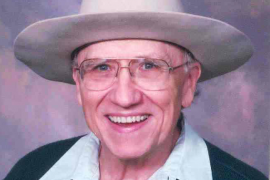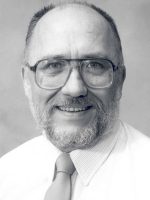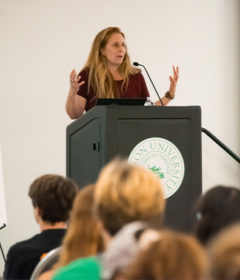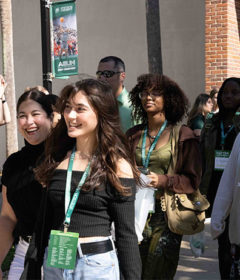Remembering Professor Neal Long

Neal Long, Ph.D., who arrived on the campus of Stetson University in 1974 as a professor of economics and retired in 2012, passed away Tuesday, Aug. 1. He was 80. A private service is planned, and a memorial will be scheduled in the next few weeks (details to come).
Neal served as chair of the Department of Economics for many years and helped to make transformative changes in the economics curriculum that will last forever at Stetson.

Having made a decision that mainstream economics, for all of its positive attributes, also was the cause of many of society’s injustices, Neal worked with Professor Ranjini Thaver, Ph.D., a longtime associate in the economics department, to focus on empowerment regardless of economic and socio-political circumstances. The effort not only brought the local community center stage, but also commanded active student engagement. Stetson became nationally known for being the first small university whose economics department took the leap toward a more holistic and humane economics curriculum.
As part of that work, Neal co-founded (with Thaver) Stetson’s first university-based Microcredit Program, CHOMI (a South African word for “friend of the heart”), in the local impoverished community of Spring Hill. The program gathered students, faculty and the Spring Hill community to empower members of Spring Hill to develop sound business plans, enabling them to acquire small loans for their businesses. Also, without any pay for his work, Neal supported the resulting small businesses in all areas of marketing and finance. Eventually, CHOMI was expanded to a rural community on the slopes of Kilimanjaro, Tanzania.

Neal went further in Spring Hill. He identified the challenges of the police presence there and, together with then-Stetson President Doug Lee and Thaver, effectively changed the narrative, turning the police station into a community resource center for residents. He also worked with the City of Deland and Volusia County economics divisions to facilitate opportunity fairs for Spring Hill residents, and coordinated internships for students within those divisions. The City of Deland awarded a certificate of excellence to the economics department for its economic-development work.
In addition, Neal knew the value of interdisciplinary and multidisciplinary learning. For years, he encouraged the economics department to offer courses across the entire university. By the time he retired, the department’s presence was felt in the School of Business, the Honors Program, Gender Studies, Environmental Studies, Africana Studies and Latin-American Studies, among others.
“In many ways, Neal’s commitment to interdisciplinary education and justice throughout society presents a model to which we should all aspire,” Stetson Provost Noel Painter, Ph.D., says. “Stetson’s acknowledgement of Dr. Long’s citizenship and life commitments through the 2006 Hand Award for Community Service serves as a symbol of the lasting impact that Neal has had on our institution.”
Neal was the chair of Stetson’s Community Service Council (one of the seven councils that were part of Stetson’s Values Council at the time), and he was actively involved in the local chapter of the NAACP.
“Despite the extensive list of Neal as a transformative member of the Stetson community, what I remember most about Neal is his gentle spirit!” Professor Thaver comments. “He did not have a bone in his body that would hurt the smallest and most insignificant of life. In many ways, he was the embodiment of Gandhi, Martin Luther King and Mother Teresa. His whole life was dedicated to others without concern for whether or not they are deserving of his service.
“His heart print is permanently etched in the economics department, the larger Stetson University and the even larger local community. His presence will always be felt!”
— Michael Candelaria (with special thanks to Professor Ranjini Thaver, Ph.D.)



